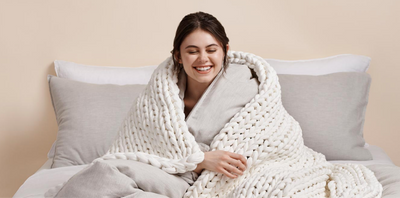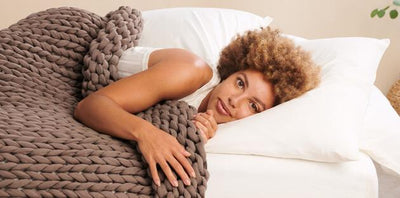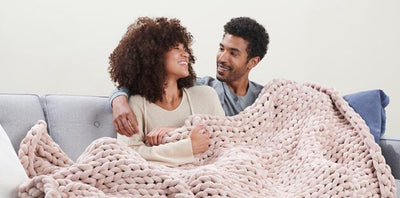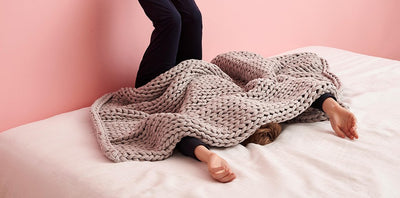Is Sleeping On the Floor Good For You: The Pros & Cons
Sleeping on the floor can be good for your posture, may relieve back pain, keeps you cool and is a great way to save space. Unfortunately, the research into its benefits isn't conclusive, and sleeping on the floor can be difficult for others. It also means more frequent cleaning to avoid allergens.

Bearassentials
Sleeping on the floor can help improve posture, back pain, and is a great way to maximize space.
Side sleepers, the elderly, and those sensitive to allergens may want to stay away.
Cleaning your mattress and sleeping area once a week is crucial when sleeping on the floor.
Did you know?
In Japan, there are countless types of futon mattresses, all with different characteristics. There are different materials, different firmness levels, and many unique covers, just as with box spring mattresses in North America
Do you wake up with aches and pains after a long snooze? Looking for solutions and wondering if sleeping on the floor is good for you?
Dozing on the ground isn't a new idea. Humans were doing it long before the invention of the mattress, and many cultures still do today. Now it’s becoming fashionable again in the west.
There are many potential benefits to sleeping on the floor like improved back health, but there may be negative consequences too. As with anything, personal preference plays a large role in deciding if napping on the hardwood is the right choice.
Pros of Sleeping on the Floor
The benefits of sleeping on the floor are still relatively unknown. Plenty of studies have been done on the topic, but unfortunately scientists haven’t drawn firm conclusions. Because of that, one person may not see the same benefits as another.
With that said, some people swear by curling up on the floorboards, and their stories usually have a handful of positives in common.

Cooler Temperatures
Staying cool at night is one of the best ways to ensure a good night’s sleep, and setting up on the floor may provide a slight advantage. Since heat rises, the cooler temperatures tend to be lower down. So if you’re someone who runs hot, this may be the ticket to better sleep.
Improved Posture
Whether or not sleeping on the floor helps your posture is still up for debate, but it’s one of the potential advantages. The logic behind it is that softer mattresses allow for the shoulders and back to sink into the bed at odd places, and a hard floor would stop that
There isn't a lot of evidence to say whether that’s true one way or another, but many people swear the floor improves posture.
Improved Back Pain
Just as it may help you improve your posture, sleeping on the floor can also be good for back pain. It makes sense as the two often go hand in hand. Unfortunately, this is another area where you’ll just have to see for yourself if it works for you.
A 2019 research review published in BMJ Open examined 4,186 articles that mostly examined waking pain and stiffness after a night in different sleeping positions. There were some promising findings, but it concluded that there weren’t enough high-quality studies to answer the question.
May Help With Sciatica
Sciatica is a condition resulting from painful contact with the sciatic nerve in the lower back. It often leads to intense lower back pain that can run all the way down the leg. And studies show that the resulting pain can negatively impact sleep.
Conking out on the floor may help treat sciatica if you set up with a body pillow like our Cuddler under the knees. This can keep the spine in a comfortable state throughout the night. Without the extra support, sleeping on the floor may be tough on the spine if you’re a back sleeper
Minimalistic
Another benefit of sleeping on the floor is that it synchs up really well with the minimalistic lifestyles that have become popular recently. It makes sense, because beds take up a big chunk of space. Take that out of the equation and replace it with a foldable mattress that you can shove in the closet and you’re well on the way to unburdening yourself.
Cons of Sleeping on the Floor
Along with the reported advantages, there are several disadvantages to sleeping on the floor.
Some of these are more severe than others, and in most cases you can avoid them by taking a few simple precautions.

Not Suited to Those Who Have Troubles Getting Out of Bed
Getting up from a lying-down position to sitting up can be difficult for many people, especially the elderly and those with existing back issues. Beds make this a little bit easier, so switching to floor sleeping where the legs can’t hang over the edge in the morning may be challenging for some.
Not Suited to Side-Sleepers
Do you spend a big chunk of the night on your side? If so, hard surfaces may not be the best thing for you or your shoulders. The lack of cushion can end up folding the lower shoulder and arm in toward the chest more than softer mattresses, aggravating the joints.
May Increase Risk of SIDS
Those planning on floor-sleeping with a little one may want to reconsider as it’s a growing concern with SIDS (Sudden Infant Death Syndrome) researchers. Fortunately, it seems to be preventable as long as you keep the kids away from hazards like plastic bags, cushions, and tight spaces that can restrict breathing.
Published in the Journal of Paediatrics and Child Health, A 2011 review of Australian autopsy cases over a 10-year period from 2001 found that, “Although such deaths are not common, they may be more prevalent when there is overcrowding and reduced sleeping space.”
Mattress Mold
A more obvious source of concern from sleeping on the floor is mattress mold. And unless you’re sleeping directly on the floor, it’s something you’ll need to combat.
Whether you’re using a thin futon mattress or a pile of blankets, the heat from your body will produce moisture that gets trapped between you and the floor. If you leave your bedding to sit in that, mold can grow quickly.
Allergens
Similar to mold, there are plenty of other allergens more common on ground level that you may need to worry about. In particular, dust mite allergens tend to be the worst offenders, and they may collect more easily on the ground.
Not a Good Fit for Some People
Just as some people prefer different types of bed mattresses, some people may not like sleeping on the floor. The rigid surface isn’t a one-size-fits-all solution to back problems or posture, and for some people it can even make things worse. Give it a try for a night or two and see how you feel before committing to this whole new world of dozing.
How To Sleep on the Floor
Did you read all of this and decide that sleeping on the floor is the move for you? Well, there are a few things to keep in mind.
First, understand that most cultures that sleep on the floor don’t sleep directly on the floor. Instead, they usually use something thin like a futon mattress that can be stowed away.
Second, body pillows like our Cuddler and bolster pillows like our Cuddling could be your best friend. Lying flat on the floor can put strain on the spine, and sliding a pillow under the knees can help. You can also try our bolster pillow under the lower back as a form of lumbar support.
Finally, hugging a body pillow can help reduce shoulder pain in side sleepers and keep the spine in line.
Best Floor Sleeping Position
As with beds, sofas, chairs, or wherever you choose to plop down for a snooze, the best floor sleeping position is the one that leaves you feeling rested and pain-free.
With that said, lying on the back is the most popular floor sleeping position, often with a pillow under the knees to support the spine’s natural curve. It may help to decompress your spine while sleeping.
Floor Sleeping Hygiene
Because of the allergens that collect on the ground and in your mattress, cleanliness becomes even more important when sleeping on the floor.
A 2016 study in the Journal of Asthma found that there were a few precautions that help to keep skin and airway reactions at bay. These should be done at least once every week
- Vacuum the futon mattress and hang it outside, preferably on a sunny day to get rid of dust mites.
- Vacuum and wipe down the floor around the mattress area
- Use a cover for your futon mattress when sleeping and clean it regularly
FAQs
Got more questions about sleeping on the floor? Here are some of the most common ones along with the answers.
Is It Okay To Sleep on the Floor Every Day?
It’s okay to sleep on the floor every day as long as you’re not experiencing abnormal pain during the night or in the morning. Pillows under the knees can help with this if you’re a back sleeper, and hugging a body pillow may help side sleepers. However, you may want to quit if you feel like sleeping on the floor is causing more back problems.
Also, aim to air out the mattress and clean the area around and under it once per week.
Why Do the Japanese Sleep on the Floor?
Japanese people sleep on the floor for a few different reasons. One is to conserve space, as traditional Japanese homes were less spacious than they are today. Co-sleeping is also popular in Japan among families with young children, and spreading out futon mattresses makes this easier.
However, the times are changing in Japan and many people now sleep on western style beds. Still, some prefer the older style of laying out futon mattresses on the floor.
What Is the Healthiest Way To Sleep on the Floor?
The healthiest way to sleep on the floor is to lay on your back with pillows under the knees to support the natural curve of your spine, if necessary. Some people enjoy sleeping on their sides, but this can occasionally cause strain on the shoulder joints because of the harder sleeping surface.
Most people will also find it necessary to use a thin futon mattress at the very least. Without it, the hard floor can lead to frequent sleep disturbances.
Who Should Not Be Floor Sleeping?
The most obvious group of people who should not be floor sleeping are the elderly and those with mobility-reducing conditions like arthritis. Getting up from beds and chairs is difficult enough with age as is, and getting up from the floor would only add an extra burden.
The other group that may want to be cautious is families co-sleeping with young children
Of course, anyone who finds sleeping on the floor painful or difficult may also want to consider giving it up.
Why Does Lying on the Floor Help Anxiety?
Sleeping on the floor doesn’t necessarily help with anxiety, though it seems to be a coping mechanism for certain people. The theory is that for some PTSD and anxiety disorder patients, sleeping on the floor ensures a lighter sleep. This may help calm the nerves, knowing that if something were to happen, they could wake up more easily.
The actual effects on anxiety patients of sleeping on the floor haven't been studied enough to come to any solid conclusions. However, a therapeutic technique known as deep touch pressure, or grounding, has been known to improve symptoms associated with anxiety.
Is It Good To Sleep on a Hard Surface?
It’s good to sleep on a hard surface for some people, but many prefer at least some cushion. In a study on mattress types, medium-firm was found to be the best for back pain relief.
A smaller study conducted on sleeping in a gymnasium in Japan found that 57% of adults had difficulties sleeping on the hard floor.
In the end, some people will enjoy sleeping on a harder surface, while others may find they just can’t even catch a handful of Z’s. It often comes down to individual preference.
Conclusion
Sleeping on the floor may be good for posture, back pain, and even cooling down. However, it can also be difficult for groups like the elderly and those who have difficulties with dust allergies.
A body pillow like the Cuddler under your knees or our Cuddling bolster pillow may help make things a little more comfortable, and keeping the mattress and sleeping area clean are also crucial. Set things up properly, you could be on your way to a more comfy snooze.







